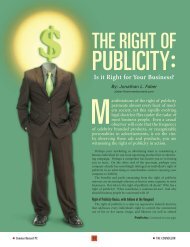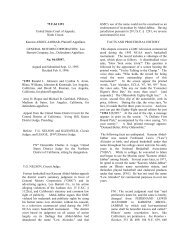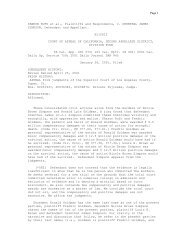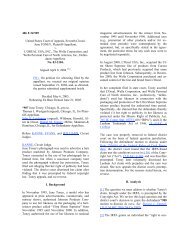Johnny Carson v. Here's Johnny Portable Toilets ... - Right Of Publicity
Johnny Carson v. Here's Johnny Portable Toilets ... - Right Of Publicity
Johnny Carson v. Here's Johnny Portable Toilets ... - Right Of Publicity
Create successful ePaper yourself
Turn your PDF publications into a flip-book with our unique Google optimized e-Paper software.
intentionally appropriated for commercial purposes.We simply disagree that the authorities limit the rightof publicity as contended by the dissent. [FN3] It isnot fatal to appellant's claim that appellee did not usehis "name." Indeed, there would have been noviolation of his right of publicity even if appellee hadused his name, such as "J. William <strong>Carson</strong> <strong>Portable</strong>Toilet" or the "John William <strong>Carson</strong> <strong>Portable</strong> Toilet"or the "J.W. <strong>Carson</strong> <strong>Portable</strong> Toilet." The reason isthat, though literally using appellant's "name," theappellee would not have appropriated <strong>Carson</strong>'sidentity as a celebrity. Here there was anappropriation of <strong>Carson</strong>'s identity without using his"name."FN3. Although Michigan law is applicableand the author of the dissent is anexperienced and able Michigan lawyer andjudge, we do not understand the dissent tocontend that the law of that state inparticular proscribes the holding of themajority opinion.With respect to the dissent's general policyarguments, it seems to us that the policies there setout would more likely be vindicated by the majorityview than by the dissent's view. Certainly appellant<strong>Carson</strong>'s achievement has made him a celebritywhich means that his identity has a pecuniary valuewhich the right of publicity should vindicate.Vindication of the right will tend to encourageachievement in <strong>Carson</strong>'s chosen field. Vindicationof the right will also tend to prevent unjustenrichment by persons such as appellee who seekcommercially to exploit the identity of celebritieswithout their consent. [FN4]FN4. Appellee did not brief and make thepolicy and constitutional arguments reliedupon in the dissent. Instead, the appelleeconfined its argument to the straightforwardproposition that the right of publicity islimited to appropriation of the celebrity's"name or likeness."The dissent also suggests that recognition of the rightof publicity here would somehow run afoul of federalmonopoly policies and first amendmentproscriptions. If, as the dissent seems to concede,such policies and proscriptions are not violated by thevindication of the right of publicity where thecelebrity's "name, likeness, achievements, identifyingcharacteristics or actual performances" have beenappropriated for commercial purposes, we cannot seewhy the policies and proscriptions would be violatedwhere, as here, the celebrity's identity has admittedlybeen appropriated for commercial exploitation by theuse of the phrase "<strong>Here's</strong> <strong>Johnny</strong> <strong>Portable</strong> <strong>Toilets</strong>."The judgment of the district court is vacated and thecase remanded for further proceedings consistentwith this opinion.CORNELIA G. KENNEDY, Circuit Judge,dissenting.I respectfully dissent from that part of the majority'sopinion which holds that appellee's use of the phrase"<strong>Here's</strong> <strong>Johnny</strong>" violates appellant <strong>Johnny</strong> <strong>Carson</strong>'scommon law right of publicity. While I agree thatan individual's identity may be impermissiblyexploited, I do not believe that the common law rightof publicity may be extended beyond an individual'sname, likeness, achievements, identifyingcharacteristics or actual performances, to includephrases or other things which are merely associatedwith the individual, as is the phrase "<strong>Here's</strong> <strong>Johnny</strong>."The majority's extension of the right of publicity toinclude phrases or other things which are merelyassociated with the individual permits a popularentertainer or public figure, by associating himself orherself with a common phrase, to remove thosewords from the public domain.The phrase "<strong>Here's</strong> <strong>Johnny</strong>" is merely associatedwith <strong>Johnny</strong> <strong>Carson</strong>, the host and star of "TheTonight Show" broadcast by the NationalBroadcasting Company. Since 1962, the openingformat of "The Tonight *838 Show," after the thememusic is played, is to introduce <strong>Johnny</strong> <strong>Carson</strong> withthe phrase "<strong>Here's</strong> <strong>Johnny</strong>." The words are spokenby an announcer, generally Ed McMahon, in a drawnout and distinctive manner. Immediately after thephrase "<strong>Here's</strong> <strong>Johnny</strong>" is spoken, <strong>Johnny</strong> <strong>Carson</strong>appears to begin the program. [FN1] This method ofintroduction was first used by <strong>Johnny</strong> <strong>Carson</strong> in 1957when he hosted a daily television show for theAmerican Broadcasting Company. This case is nottransformed into a "name" [FN2] case simplybecause the diminutive form of John W. <strong>Carson</strong>'sgiven name and the first name of his full stage name,<strong>Johnny</strong> <strong>Carson</strong>, appears in it. The first name is socommon, in light of the millions of persons namedJohn, <strong>Johnny</strong> or Jonathan that no doubt inhabit thisworld, that, alone, it is meaningless or ambiguous atbest in identifying <strong>Johnny</strong> <strong>Carson</strong>, the celebrity. In







